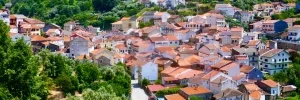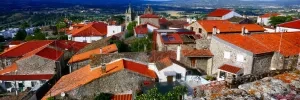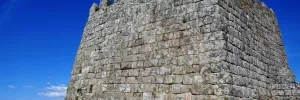Nearly 1.5km out of Famalicão on the ascent to the pass, there is a dirt road straight ahead while the switchback asphalt road turns right. Take the dirt road (there is no arrow) as it’s more direct and more pleasant. Be aware that the ‘top’ soon after is not the actual top, and there is still another ascent to make through the forest.

To arrange to stay at the albergue, call Carlos in advance on +351 966 482 853. Phone reception is poor in Trinta, so if he doesn’t answer, send him a WhatsApp message instead. The albergue has 20 beds and a kitchen, while the village has two mini-markets and restaurants.
The name of the village means ‘owlery’ and there is a small owl museum filled with figurines of owls. Ask around the village for the key.
The highest city in Portugal at over 1000m, Guarda has a Gothic cathedral, a castle and several medieval gates, of which the one at the Torre dos Ferreiros (Blacksmiths’ Tower) is the most interesting.
Leaving Guarda, the camino becomes a Roman road almost immediately and this continues for most of the descent to Ramalhosa, making it one of the most interesting stretches on the entire Caminho Nascente.
On several occasions after Rapa, the mass-produced arrows don’t have either tip painted in yellow as they usually do, leaving them as horizontal bars. This means to go straight.
Celorico da Beira has a castle that’s worth a look but not much else of note. Residencial Parque is a decent budget accommodation option southwest of the castle.

Trancoso is a walled town whose gates, towers and castle make it a worthy end to the Camino Nascente. There are a few sites to see in the old town, and it’s also a great place to wander around and have a drink to celebrate your arrival.
Restaurante O Museu is a good and popular restaurant within the walls, while Tasca do Castelo was set to launch a pilgrim menu in July 2021.
To continue on the Camino Torres from Trancoso, take the N226 northwest from the old town past the Meu Super and pick up the arrows.
